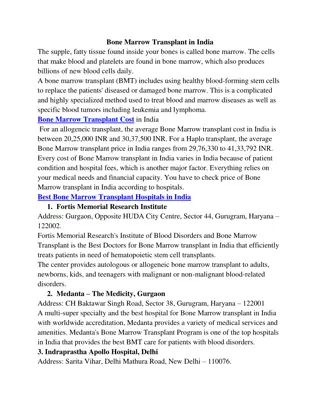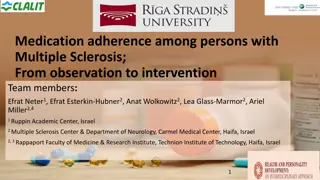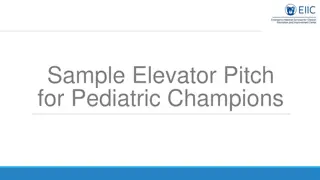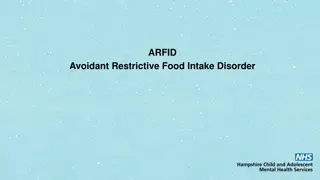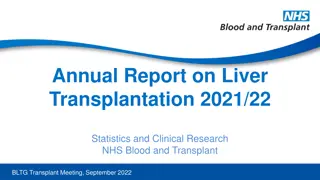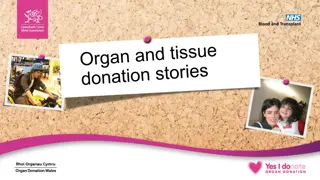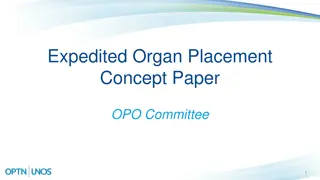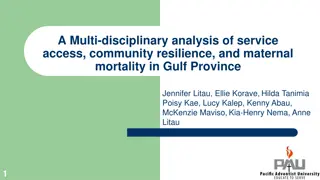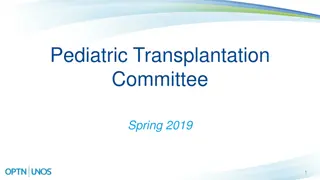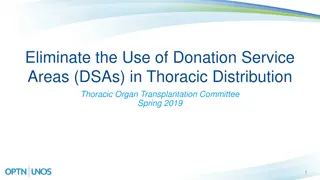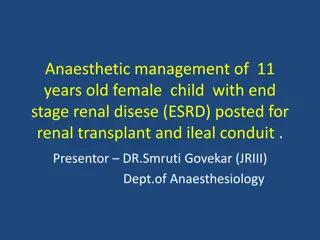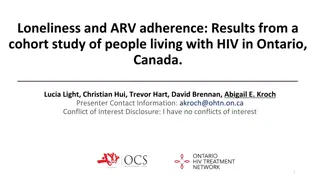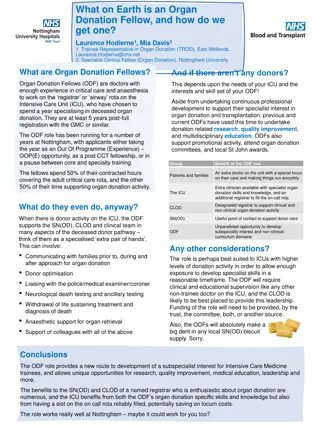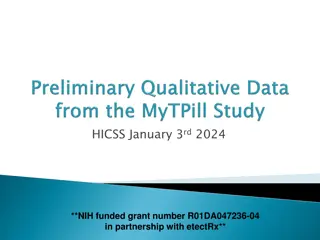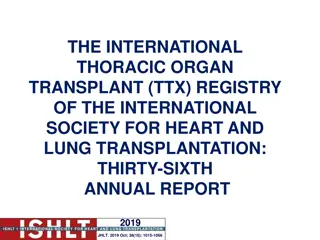Understanding Maternal Avoidant Coping and Medication Adherence in Pediatric Organ Transplant Candidates
Maternal avoidant coping styles may impact medication adherence in pediatric organ transplantation candidates. Challenges in the field include organ shortage, patient non-adherence, and identifying health risk factors for effective organ allocation. Parents' coping behavior factors of stress include the child's condition, fatigue, financial issues, and disruption to work and social life. Different coping styles like avoidant, problem-focused, socially supported, and emotion-focused coping play a role in managing stress. The hypothesis explores the risk factor of maternal avoidant coping on the medication adherence of the child. The Brief Coping Orientation to Problem Experienced (COPE) provides insight into avoidance coping behaviors through a self-report assessment.
Download Presentation

Please find below an Image/Link to download the presentation.
The content on the website is provided AS IS for your information and personal use only. It may not be sold, licensed, or shared on other websites without obtaining consent from the author. Download presentation by click this link. If you encounter any issues during the download, it is possible that the publisher has removed the file from their server.
E N D
Presentation Transcript
Its a Mind Game: Maternal Avoidant Coping Style and Medication Adherence in Pediatric Organ Transplantation Candidates Vishruti Patel Mentors: Elizabeth Steinberg, PhD & Cindy Buchanan, PhD
Pediatric Organ Transplantation 1,878 children received transplants in 2016 More than 2,000 children still waiting Pediatric (0-17 yrs) Transplants by Age of Recipients- 2016 Pediatric (0-17 yrs) Transplants by Organ Type - 2017 5% 14% 8% Kidney < 1 year 17% 42% 48% Liver 1-5 years 30% Heart 6-10 years 22% 14% Intestine 11-17 years Other https://optn.transplant.hrsa.gov
Challenges in Organ Transplantation 1. Supply organ shortage Waiting time: months to a few years The Shortage in Organs 2. Patient attitude to care Non-adherence rates range from 30 -70% Consequences: rejection, retransplantation, mortality Focus: identify health risk factors to ensure effective allocation of organs ** includes deceased and living donors https://organdonor.gov/statistics
Parents Coping Behavior Factors of stress : child s condition, fatigue, financial issues, and disruption to work and social life Types of coping styles: Avoidant coping: maladaptive and avoids stressors Problem focused coping: problem-solve and tackle life s challenges Socially supported coping: people/groups provide comfort and resources Emotion focused coping: positive outlook and reduce painful emotions (Annunziato R.A.,et.al. Psychosocial assessment prior to pediatric transplantation: A review and summary of key considerations. Pediatric Transplantation, 14: 565-574)
Hypothesis Risk factor: Utilization of avoidant coping styles by mother Health outcome: Medication adherence of child
Brief Coping Orientation to Problem Experienced (COPE): Self-report assessment Utilization of avoidance coping styles as composite score of 5 subscales: - Behavioral disengagement - Denial - Substance use - Self-blame - Self-distraction Higher composite score = greater utilization of avoidance coping behaviors I give up trying to deal with it. I refuse to believe that it has happened
Pediatric Transplant Rating Instrument (P-TRI): Assessment completed by clinical psychologist during transplant evaluation Subjective measure of child s medication adherence (proxy measure) Score of 1-4 with higher score indicating greater medication adherence of child
Patient Population 86 pediatric organ transplantation candidates Patient Demographics: Demographic Group Gender Pediatric Organ Transplant Candidates 45.3 % (n = 39) 54.7 % (n = 47) 84.9 % (n = 73) 2.3 % (n = 2) Female Male White Race Native American/Alaska Native More than one race Other Non-Hispanic/ Latino Heart Kidney Liver 2.3 % (n = 2) 10.5 % (n = 9) 82.0 % (n = 73 ) 33.7 % (n = 29) 34.9 % (n = 30) 31.4 % (n=27) Ethnicity Transplant Type
Maternal Utilization of Avoidant Coping Style by Child s Transplant Type 7 Number of Mothers 6 5 4 3 2 1 0 0 5 10 15 20 25 30 35 Mother's Composite Avoidance Coping Score Legend Mean Composite Scores Heart (17.0) Kidney (15.7) Liver (17.2) Heart Kidney Liver
Maternal Avoidant Coping Style and Medication Adherence Descriptive Statistics Scale Range (min max) Mean SD Maternal Avoidant Coping Style (Brief Cope) 22 16.3 4.1 (9-31) Medication Adherence of Child (P-TRI) 2 3.8 0.5 (2-4) Distribution of P-TRI scores There was no significant correlation between maternal avoidant coping style and child s medication adherence (rs= -0.007, p = 0.951). non-normally distributed, with skewness and kurtosis present Frequency P-TRI score
Discussion Maternal avoidant coping style showed no relationship to child s medication adherence. Limitations: Low variability: P-TRI s restricted scoring scale and anchors Social desirability bias: Brief COPE is an self-report measure Sample size: Response rates are a challenge with self-reported assessments
Future Directions Use of objective markers of adherence (medication lab levels, medication refills, etc.) Father s use of avoidant coping behaviors and it s relationship to child s medication adherence Development of different models for evaluation of risk factors in a clinical setting
References 1. United States Department of Health and Human Services. Organ Donation Statistics (Data file) Annunziato R.A.,et.al. Psychosocial assessment prior to pediatric transplantation: A review and summary of key considerations. Pediatric Transplantation, 14: 565-574. Steinberg, E.A., et.al. (2017). Adherence in pediatric kidney transplant recipients: solutions for the system. Pediatric nephrology. Engle, D. Psychosocial aspects of the organ transplant experience: What has been established and what we need for the future.(2001). Journal of Clinical Psychology, 5(4): 521-549 Bergvik, S. (2010). Approach and avoidance coping and regulatory focus in patients having coronary artery bypass graft surgery. Journal of Health Psychology, 15(6): 915-924. Nahlen Bose, C., et.al. (2015). Assessment of Coping Strategies and Their Associations With Health Related Quality of Life in Patients With Chronic Heart Failure: the Brief COPE Restructured. Cardiology Research, 6(2), 239 248. Fisher, M., et.al. (2011). Inter-rater reliability of Pediatric Transplant Rating Instrument (P-TRI) Challenges to reliably identifying adherence risk factors during pediatric pre-transplant evaluations. Pediatric Transplantation, 15: 142-147. Olbrisch, M.E., et. al. (2002). Psychological Assessment and Care of Organ Transplant Patients. Journal of Consulting and Clinical Psychology, 70(3), 771-783. 2. 3. 4. 5. 6. 7. 8.
Acknowledgement Cindy Buchanan, PhD Elizabeth Steinberg, PhD Merlin Ariefdjohan, PhD, MPH Emmaly Owens, MA Amanda Suplee, PhD Sarah Kelly, PhD Robert Evans Naadira Upshaw Marisa Deguzman Jaime Shoop Dr. Dominique Martinez (CCTSI), Dr. Douglas Novins and Dr. Jennifer Hagman (PMHI) for their generosity in allocating funds to support the program 2017 Summer Research Program for Undergraduate Students at the Pediatric Mental Health Institute



